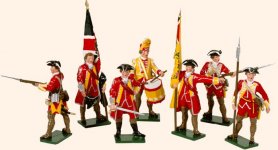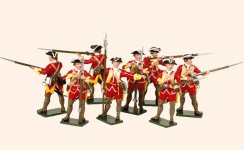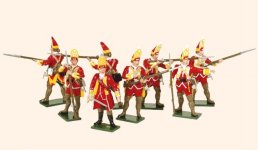Accept offers only for the whole group, not individual figures.
Asking $110 per group which includes postage to the US. These sell at GBP 139
No boxes available.
Figures in great shape
Contact at
egonzinc@caribe.net
These are sets
601 Toy Soldiers Set British Infantry
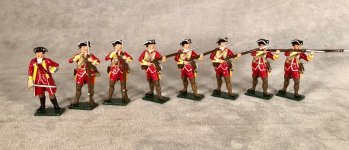
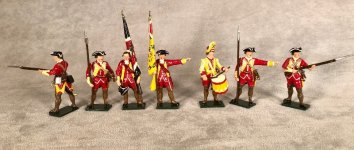
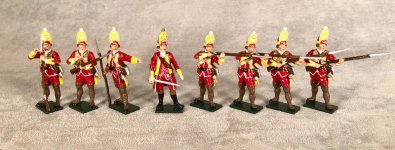
Asking $110 per group which includes postage to the US. These sell at GBP 139
No boxes available.
Figures in great shape
Contact at
egonzinc@caribe.net
These are sets
601 Toy Soldiers Set British Infantry
An Officer, two Ensigns, Sergeant, Drummer and two Corporals
54mm British Army North America 1750
PLEASE NOTE IMAGES SHOW TWO NCOs instead of one NCO and ONE officer in this set
602 Toy Soldiers Set British Infantry
604 Toy Soldiers Set British Grenadiers
54mm British Army North America 1750
PLEASE NOTE IMAGES SHOW TWO NCOs instead of one NCO and ONE officer in this set
602 Toy Soldiers Set British Infantry
A Sergeant and seven Privates
54mm British Army North America 1750
PLEASE NOTE IMAGES SHOW ONE officer instead of one NCO in this set
54mm British Army North America 1750
PLEASE NOTE IMAGES SHOW ONE officer instead of one NCO in this set
604 Toy Soldiers Set British Grenadiers
An Grenadier Officer, Grenadier Sergeant, six Privates
54mm British Army North America 1750
Figures represent the 44th REgiment of Foot in North America at the time of the French and Indian War. See details below...
54mm British Army North America 1750
Figures represent the 44th REgiment of Foot in North America at the time of the French and Indian War. See details below...



44th Regiment of Foot
The regiment was raised by Colonel James Long as James Long's Regiment of Foot in 1741. The regiment saw active service at the Battle of Prestonpans in September 1745 during the Jacobite rising. Ranked as the 55th Regiment of the Line in 1747, the regiment was renamed the 44th Regiment of Foot in 1751[SUP]][/SUP] It embarked for North America in January 1755 for service in the French and Indian Wa[SUP]r[/SUP] and took part in the Battle of the Monongahelawhere Colonel Sir Peter Halkett was killed while commanding the regiment.The regiment went on to fight at the Battle of Carillon in July 1758 and the Battle of Fort Niagara in July 1759 before returning home in 1765.
Later it returned to North America, but by then the uniform details would have been different...
The regiment returned to North America landing in Boston in 1775 for service in the American Revolutionary War. It saw action at the Battle of Brooklyn in August 1776, the Battle of Brandywine in September 1777 and the Battle of Germantown in October 1777 as well as the Battle of Monmouth in June 1778. In May 1780 the regiment moved to Canada returning home in September 1786. In 1782, most British regiments of foot were given county designations, and the regiment became the 44th (the East Essex) Regiment of Foot.
The regiment was raised by Colonel James Long as James Long's Regiment of Foot in 1741. The regiment saw active service at the Battle of Prestonpans in September 1745 during the Jacobite rising. Ranked as the 55th Regiment of the Line in 1747, the regiment was renamed the 44th Regiment of Foot in 1751[SUP]][/SUP] It embarked for North America in January 1755 for service in the French and Indian Wa[SUP]r[/SUP] and took part in the Battle of the Monongahelawhere Colonel Sir Peter Halkett was killed while commanding the regiment.The regiment went on to fight at the Battle of Carillon in July 1758 and the Battle of Fort Niagara in July 1759 before returning home in 1765.
Later it returned to North America, but by then the uniform details would have been different...
The regiment returned to North America landing in Boston in 1775 for service in the American Revolutionary War. It saw action at the Battle of Brooklyn in August 1776, the Battle of Brandywine in September 1777 and the Battle of Germantown in October 1777 as well as the Battle of Monmouth in June 1778. In May 1780 the regiment moved to Canada returning home in September 1786. In 1782, most British regiments of foot were given county designations, and the regiment became the 44th (the East Essex) Regiment of Foot.


